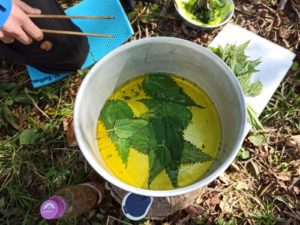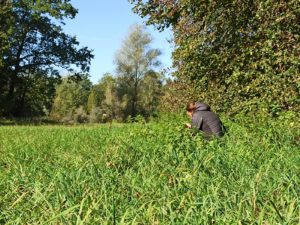Green-Care project scientific study confirms: mindfulness exercises in nature benefit depressive patients
© Daniel Krebs, Weisbach
A year ago, EUROPARC organised the webinar “Ways to Wellbeing in Nature – Activating Parks and Protected Areas as natural health centres”. We focused on mental health initiatives and dived into experiences from Parks and Protected Areas in our network. The scientific results of the pilot project “Green Care | Nature & Mental Health” are now available in English!
____________________________________________________________________________________________________________
Last December, the German Biosphere Region Berchtesgadener Land, together with the Biosphere Reserve Rhön (Bavarian part) were in the last phase of the Green-Care project. Here, nature-based mindfulness training was tested to support hospitalised patients suffering from several mental health conditions (e.g. depression, burn-out) to discover nature as a resource for their own everyday life. In parallel, courses for prevention purposes were organised for the local residents.
The project was accompanied by a scientific monitoring study (December 2019 – April 2023) from the Catholic University of Eichstätt-Ingolstadt, which released the final report in German earlier this year. We are pleased to also share with you the English version!
For years, the number of people who suffer from depression or anxiety disorders has increased all over Europe, including in Germany. According to the German Psychotherapeutic Association (2021) with the onset of the COVID-19 pandemic, mental stress increased steadily. Despite a dense network of treatment options for mental illnesses, patients have to wait an average of 19.9 weeks for a therapy spot (Bundespsychotherapeutenkammer, 2018). The associated sick days, sickness absence, and reduced productivity are not only an individual burden for patients but also have a huge socio-economic impact on society.

© Christoph Rothmayr, Brennnesselchips
During the project period, the effectiveness of selected mindfulness and relaxation-based nature interventions (“Greencare”) as a supplement to psychosomatic rehabilitation treatment for depressive patients was investigated (case study page). A group of healthy individuals were also offered the mindfulness-based intervention. Treatments were compared to waitlist control groups. In the clinical setting, control groups received treatment in addition to the waitlist.
The results of the scientific research show that both patients with depression from rehabilitation clinics and healthy individuals from the general population seeking preventive measures for stress reduction benefited from the offered mindfulness and relaxation activities in nature. In the clinical setting, patients with higher levels of depression on admission benefited most from the group offerings. Analysis of the questionnaires showed that nature activities enhanced positivity and feelings perceived as stressful were alleviated through the sessions.

© Annemarie Rohrmaier, Pflanzenbegegnung
This effect was still measurable three months after the group sessions, suggesting that the activities were integrated into the participants’ daily lives and had a positive and lasting effect.
One major reason is that different types of activities can be carried out in various natural and cultural landscapes. Practicing the activities in remote forest areas, smaller urban green spaces, wooded areas, and meadows has proved feasible and effective.
The results also indicate that the emotional connectedness to nature, which is a crucial prerequisite for the willingness to engage in nature conservation, increased as a result of the sessions.
The study demonstrated that the innovative offerings provided have been effective.